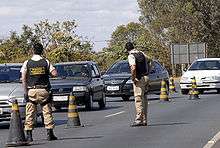Law enforcement in Brazil

In Brazil, the Federal Constitution establishes five law enforcement institutions: the Federal Police, the Federal Highway Police, the Federal Railway Police, the State Military Police and Fire Brigade, and the State Civil Police. Of these, the first three are affiliated to federal authorities and the latter two subordinated to state governments. All police institutions are part of the Executive branch of either federal or state government. Apart from these five institutions there is another one which is affiliated to municipal authorities: the Municipal Guards. The Municipal Guards de jure is not considered a public security force, but federal law 13,022 (in effect since August 8, 2014) gave them de facto police attributions.
According to the Supreme Federal Tribunal, the only security forces considered police units by Brazilian law are the ones listed in article 144 of the Federal Constitution, that is, the five aforementioned police forces.[1]
There are two primary police functions: maintaining order and law enforcement. When criminal offences affect federal entities, federal police forces carry out those functions. In the remaining cases, the state police forces undertake police activities.
History

The first groups assigned with security duties in Brazilian territory date back to the early sixteenth century. Small, incipient units were designated in the Brazilian coastline, with the main function of fending off hostile foreign invaders. In 1566, the first police investigator of Rio de Janeiro was recruited.[2] By the seventeenth century, most "capitanias" already had local units with law enforcement functions. On July 9, 1775 a Cavalry Regiment was created in Minas Gerais for maintaining order. At the time, intense gold mining had attracted attention and greed of explorers, generating tensions in the area.[3]
In 1808, the Portuguese royal family relocated to Brazil, due to the French invasion of Portugal. King João VI sought to reshape the administrative structure of the colony. Among several reforms, he established the "Intendência Geral de Polícia" (General Police Intendancy), which merged police units with investigative functions, call currently of Civil Police. He also created a Military Guard with police functions on 13 May 1809. This is considered a predecessor force of local military police units. Later, in 1831, when independence had already been declared, each province started organizing its local "military police", with order maintenance tasks.
On 31 January 1842, law 261 was enacted, reorganizing the investigative offices, the current "civil police".
The first federal police force, the Federal Railroad Police, was created in 1852.
Finally, in 1871, law 2033 separated police and judicial functions, creating the general bureaucratic structure and mechanisms still adopted nowadays by local police forces.[4] In 1944, a federal police institution was created. The current Federal Police department was conceived on November 16, 1964.[5] During the military dictatorship, some political police organizations were maintained, such as the DOI-CODI.
Primary functions
Law enforcement and maintaining order are the two primary functions of Brazilian police units. In Brazilian Law, maintaining order is considered a preventive effort whereby police troopers patrol the streets to protect citizens and discourage criminal activity. Law enforcement consists of criminal investigation after an offence.[6]
Prevention and investigation in Brazil are divided between two distinct police organizations. Local "military police" forces only have order maintenance duties. Correspondingly, "civil police" institutions are responsible solely for crime investigation. However, at the federal level, the Federal Police is commissioned with both preventive and investigative functions of federal crimes.[7]
Federal institutions

There are three federal police institutions in Brazil: the Federal Police, the Federal Highway Police, and the Federal Railway Police.
- The Federal Police, officially the "Departamento de Polícia Federal", is described by the Constitution as "a permanent administrative organ of the federal Executive branch".Main assignments are the investigations of crimes against the Federal Government or its organs and companies, the combat of international drug trafficking and terrorism, and immigration and border control police[7] (includes airport and water police).It is directly subordinated to the Ministry of Justice.
- The Federal Highway Police, also described as "a permanent administrative organ of the federal Executive branch", has the main function of patrolling federal highways. It maintains order, but does not investigate crime.[7]
- The Federal Railway Police, is the third and last component of the federal police force. Like the previously mentioned institutions, the Federal Railway Police is described as "a permanent administrative organ of the federal Executive branch" with the main function of patrolling the federal railway system. It does not investigate crime, solely focusing on order maintenance.[7]
State institutions


There are two types of state police institutions: the Military Police/Military Firefighters Corps and the Civil Police.
- The Military Police and Fire Brigade is the state police charged with maintaining order. It patrols the streets and imprisons suspects of criminal activity, handing them over to Civil Police custody or, in case of federal crimes, to the Federal Police. It is a "militarized" institution (gendarmerie) because it is based on military principles of hierarchy, uniform, discipline, and ceremony. However, the body is not a branch of the Brazilian Armed Forces. It is described by the constitution as an "ancillary force of the Army in time of war".[7] The Military Fire Brigade, in general, is a part of the Military Police, although it does not perform traditional policing duties. It is subordinated to the state government.
- The Civil Police is the state police with criminal law enforcement duties. It has the function of investigating crimes committed in violation of Brazilian criminal law.[7] It does not patrol the streets and generally does not use uniforms. Like the Military Police, it is subordinated to the state government.
Other security forces

- Municipalities may create Municipal Guards. They have the duty of protecting property, people, traffic, services and facilities of local governments and others.[7] They are the most new police institutions and the first municipal category to be on the primary constitution [Constituição Federal]. They order maintenance and make the law enforcement obligations, like patrol and arrest with or not flagrant, since August 2014, when the President of Brazil gave then the legal obligation to obay the regular use of Police Power, like Military Police, Civil Police or other but the primary obligation of they still protection of buildings, communitary police and services and protection of politicians. They are not listed in article 144 of the Federal Constitution as an autonomous police unit yet. There are over 1200 Municipalities with Municipal Guards Departments with 120.000 operatives. To become one municipal cop on Brazil need more than 18 years old and highschool degree, tests about knowledge of laws, language etc. .
- The Federal Agents of Security work on Public Federal Institutions like federal court house, Tribunais Federais (TST),(TRT),(TSF). Or Policia Federal do Senado (Senate Federal Police Agency of Brasil) Need be more than 21 years Old and have license to drive blinded cars (Truck License, category D) and highschool degree and fisicals tests.
- The Treasury Agents of Brazilian IRS [Secretaria da Receita Federal Do Brasil] and States Revenues (SEFAZ) Auditores Fiscais and Analistas Fiscais have Power of Police to get pirate productions like cigarettes, electronics, unpaid taxes among other things. Not everyone in the federal agency, but who need can carry guns and became special agents and can create special forces that work together with officials polices, like Federal Police of Brazil (PF) and Highway Federal Police (PRF) and others. Is necessary graduation on superior school (College degree) and the most hard test with many steps. They get paid sort of 20x a Brazilian wage salary.
- The National Public Security Force, officially the Força Nacional de Segurança Pública, was created by presidential decree 5.289 on November 29, 2004. It is not a security force per se. Rather, it is a federal program of cooperation among all Brazilian police forces for situations of emergency or exceptional nature.[8]
- Army, Navy and Air Force police units are not to be confused with the state Military Police. These are internal security units of each Armed Forces branch. They do not have general civil order maintenance or law enforcement functions. Other internal units may be created for protection of particular agencies or administrative entities, such as the guards of legislative houses, which are not police institutions. Nevertheless, in times of emergency, the Army has been called upon to maintain order, most notably in Rio de Janeiro.[9] There are provost corps for each of the Brazilian Armed Forces: Army Police (Portuguese: Polícia do Exército, PE) for the Army, Navy Police (Portuguese: Polícia da Marinha) for the Navy, and Air Force Police (Portuguese: Polícia da Aeronaútica, PA) for the Air Force.
Entry qualification
Access to all positions under any military police forces encompasses written knowledge tests, previous and further medical exams, physical strength, agility and endurance tests and, finally, psychological interviews and evaluation. When approved on all tests, the candidate will be considered fit to military police service and admitted in special training courses (CTSP, to graduate soldiers, and the CFO, to graduate aspiring high-ranked officials). There's a minimum entry age of 18 years and, with few variations, a maximum entry age of 30 years.
Candidates to military police lower ranks, such as 2nd class soldier (entry level), must meet a minimum of high school education.
In the civil forces, any police chief are required to hold a full degree in Law and have law practicising experienced of, at least, three years.
See also
- Crime in Brazil
- Brazilian Federal Police
- Military Police of Brazilian States
- Civil Police of Brazilian States
- Brazilian Intelligence Agency
References
- ↑ Court Decision "ADIn n.236-8/RJ" Published June 1, 2001. Accessed September 5, 2007. (Portuguese)
- ↑ Rio de Janeiro Civil Police "Historical Data" Accessed September 5, 2007.
- ↑ Minas Gerais Military Police "Histórico" Accessed September 5, 2007. (Portuguese)
- ↑ Tourinho Filho, F. 2004. Processo Penal vol.1. p.190. São Paulo: Saraiva. ISBN 85-02-04597-0
- ↑ Brazilian Federal Police Department "Histórico do DPF". Accessed September 5, 2007. (Portuguese)
- ↑ Silva, J.A. 2004. Curso de Direito Constitucional Positivo. p.758. São Paulo: Malheiros. ISBN 85-7420-559-1
- 1 2 3 4 5 6 7 "Brazilian Federal Constitution, article 144". Brazilian Government (official text). Retrieved 2007-09-05. See also: "Brazilian Federal Constitution in English", text translated to English (unofficial). Accessed September 5, 2007.
- ↑ Ministério da Justiça "Força Nacional de Segurança Pública" Accessed September 5, 2007. (Portuguese)
- ↑ Jornal da Globo "Exército nas ruas do Rio" Accessed September 13, 2007. (Portuguese)
External links
- "Brazilian Federal Police" (Portuguese)
- "Rio de Janeiro Military Police" (Portuguese)
- "Rio de Janeiro Civil Police" (Portuguese)
- "São Paulo Military Police" (Portuguese)
- "São Paulo Civil Police" (Portuguese)
- "Minas Gerais Military Police" (Portuguese)
- "Minas Gerais Civil Police" (Portuguese)
| ||||||||||||||||||||||||||||||||||||||
| ||||||||||||||||||||||||||
| ||||||||||